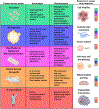Functional precision oncology: Testing tumors with drugs to identify vulnerabilities and novel combinations
- PMID: 34951956
- PMCID: PMC8752507
- DOI: 10.1016/j.ccell.2021.12.004
Functional precision oncology: Testing tumors with drugs to identify vulnerabilities and novel combinations
Abstract
Functional precision medicine is a strategy whereby live tumor cells from affected individuals are directly perturbed with drugs to provide immediately translatable, personalized information to guide therapy. The heterogeneity of human cancer has led to the realization that personalized approaches are needed to improve treatment outcomes. Precision oncology has traditionally used static features of the tumor to dictate which therapies should be used. Static features can include expression of key targets or genomic analysis of mutations to identify therapeutically targetable "drivers." Although a surprisingly small proportion of individuals derive clinical benefit from the static approach, functional precision medicine can provide additional information regarding tumor vulnerabilities. We discuss emerging technologies for functional precision medicine as well as limitations and challenges in using these assays in the clinical trials that will be necessary to determine whether functional precision medicine can improve outcomes and eventually become a standard tool in clinical oncology.
Keywords: Precision medicine; functional precision medicine; patient-derived models; precision oncology.
Copyright © 2021 The Authors. Published by Elsevier Inc. All rights reserved.
Conflict of interest statement
Declaration of interests A.L.W. has received royalties from licenses of patient-derived xenograft or organoid models issued by the University of Utah. The University may issue new licenses in the future at its discretion, which may result in additional royalties. A.L. owns equity and serves on the scientific advisory boards of Zentalis Pharmaceuticals, Dialectic Therapeutics, Anji Onco, and Flash Therapeutics. A.L. has received royalties from licenses of BH3 profiling issued by the Dana-Faber Cancer Institute. The Institute may issue new licenses in the future at its discretion, which may result in additional royalties.
Figures

References
-
- Barrile R, van der Meer AD, Park H, Fraser JP, Simic D, Teng F, Conegliano D, Nguyen J, Jain A, Zhou M, et al. (2018). Organ-on-Chip Recapitulates Thrombosis Induced by an anti-CD154 Monoclonal Antibody: Translational Potential of Advanced Microengineered Systems. Clin Pharmacol Ther 104, 1240–1248. - PubMed
Publication types
MeSH terms
Substances
Grants and funding
LinkOut - more resources
Full Text Sources
Medical

